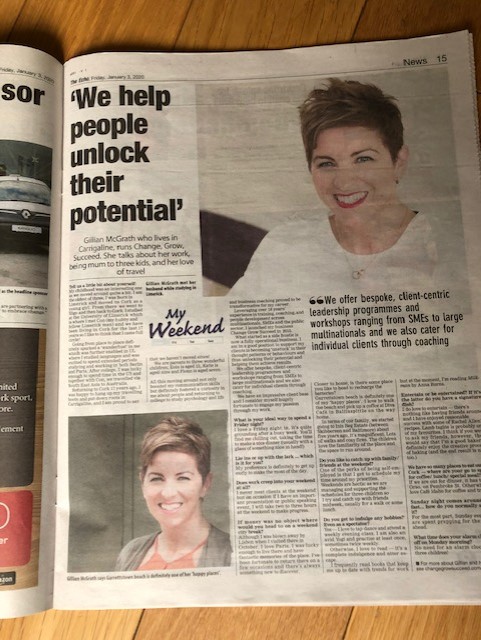It was an honor to feature in the Evening Echo recently. In this article I share my personal experience and link my interests and passions with what I do for a living. (Interview script beneath pic.)
Enjoy the read!

Tell us a little bit about yourself :
My childhood was an interesting one as we moved around quite a bit. I am the oldest of three, I was born in Limerick and moved to Cork as a young girl. From there we went to Sligo and then back to Cork. I studied at the University of Limerick which is where I met Con (my hubby and fellow Limerick man) and we are living in Cork for the last 17 years so I like to think that I came full circle!
Going from place to place definitely sparked a ‘wanderlust’ in me which was further enabled in U.L. where I studied languages and was excited to spend extended periods studying and working in both Berlin and Paris. After college, I was lucky enough to spend time in the U.S. and together with Con, we travelled via South East Asia to Australia. Returning to Cork 17 years ago, I was happy to hang up my ‘travelling boots’ and put down roots in Carrigaline. and I am proud to say that we haven’t moved since! We are parents to three wonderful children; Eoin is 13, Katie is 9 and Fionn is 7.
All this moving around not only boosted my communication skills but definitely fostered a curiosity in me about people and returning to college to study Psychology and Life and subsequently Life and Business Coaching proved to be transformative for my career.
Leveraging over 18 years’ experience in training, coaching and people development across multinationals, SMB’s and the public sector, I launched my business “Change Grow Succeed” in 2015. What started as a side hustle is now a fully operational business. I am in a good position to support my clients in becoming ‘unstuck’ in their thought patterns or behaviours and thus unlocking their potential and helping them achieve results. We offer bespoke, client- centric leadership programs and workshops ranging from SME to large multinationals and we also cater for individual clients through coaching. We have an impressive client base and I consider myself hugely fortunate to engage my passion through my work.
*What is your ideal way to spend a Friday night? (out on the town/ feet up at home/ taking in a show/ entertaining…)
I love a Friday night in, it’s quite grounding after a busy week. You’ll find me chilling out, taking the time to make a nice dinner (usually with a glass of something nice in hand!)
*Lie ins or up with the lark.. which is it for you?
My preference is definitely to get up early to make the most of the day.
*Does work creep into your weekend at all?
I never meet clients at the weekend but on occasion if I have an important presentation or public speaking event, I will take 2-3 hours at the weekend to make progress.
*If money was no object where would you head to on a weekend city break? And who would you bring with you?
Although I was blown away by Lisbon when I visited there in October, I love Paris. I was lucky enough to live there and have fantastic memories of the place. I’ve been fortunate to return there on a few occasions and there’s always something new to discover!
*Closer to home, is there some place you like to head to recharge the batteries? (particular beauty spot, walk, beach etc)
Garrettstown beach is definitely one of my ‘happy places’. I love to walk the beach and pick up a coffee at Diva Café in Ballinspittle on the way home. In terms of our family, we started going to Inis Beg Estate (between Skibbereen and Baltimore) about 5 years ago. It’s magnificent. Lots of walks and cosy fires. The children love the familiarity of the place and the space to run around!
*Do you like to catch up with family/friends at the weekend?
One of the perks of being self- employed is that I get to schedule my time around my priorities. Weekends are hectic as we are managing and supporting the schedules for three children so I try and catch up with friends’ midweek, usually for a walk or some lunch.
*Do you get to indulge any hobbies? Even as a spectator?
Yes – I love to tap dance and attend a weekly evening class. I am also an avid Yogi and practise at least once, sometimes twice weekly. Otherwise, I love to read- it’s a complete indulgence and utter escape! I frequently read books that keep me up to date with trends for work but at the moment, I’m reading ‘Milkman’ by Anna Burns.
*Entertain or be entertained? If it’s the latter do you have a signature dish?
I do love to entertain – there’s nothing like having friends around and I have enjoyed reasonable success with some of Rachel Allen’s recipes. Lamb tagine is probably one of my favourites. I think if you were to ask my friends however, they would say that I’m a good baker. I definitely enjoy the creative process of baking (and the end result is nice too!)
*We have so many places to eat out in Cork – where are your go to spots for coffee/ lunch/ special meal?
If we are out for dinner, it has to be Orso, on Pembroke Street. Otherwise, I love Café Idaho for coffee and treats.
Sunday night comes around too fast.. how do you normally spend it?
For the most part, Sunday evening’s are spent prepping for the week ahead.
*What time does your alarm clock go off on Monday morning?
No need for an alarm clock with 3 children!










